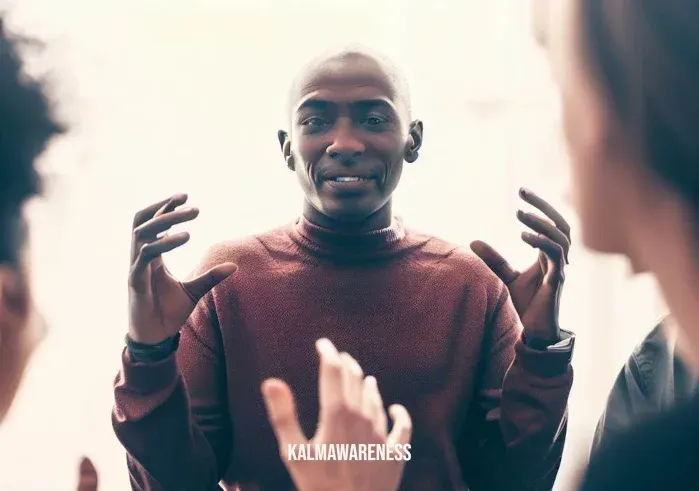Feeling Small: A Journey into Personal Growth and Self-Worth
Exploring The Universe Within
Life is an extraordinary journey, filled with moments of joy, pain, growth, and uncertainty. Yet, every so often, we may find ourselves feeling small, seemingly insignificant against the vast backdrop of the cosmos. This sensation can emerge from various origins; perhaps it’s a product of relationship anxiety, or it might be related to the uncertainty of one’s self-worth. Feeling small isn’t an uncommon experience, but it’s a state that requires understanding and nurturing to navigate and ultimately overcome.
Feeling small often comes hand-in-hand with the sensation of vulnerability. The experience of vulnerability can be intimidating, but it is, in essence, a testament to our courage and our human capacity to feel. It may lead us to embrace the cringe of discomfort and awkwardness, as we stand bare-faced before our own fears and insecurities.
“Vulnerability is not winning or losing; it’s having the courage to show up and be seen when we have no control over the outcome.” – Brene Brown
The challenge with feeling small is often linked to our perception of self-worth. The self-esteem mirror often reflects the values and judgments we’ve internalized over the years, from various sources like societal standards, parental expectations, or personal experiences. Feeling small can occur when these internalized values collide with our present reality, leaving us feeling insufficient or lacking.
Fortunately, the beauty of our journey lies in the potential for personal growth and transformation. The first step towards growth is recognizing our current state and understanding its roots. Are you struggling with self-love? Or perhaps you’re dealing with the fear of abandonment? Understanding these sources can pave the way for healing and growth.
In the grand scheme of things, feeling small is a moment in time, a point in our personal journey. But remember that each moment of discomfort is also a stepping stone towards understanding ourselves better. As the saying goes, “life isn’t about how many breaths you take, but the moments that take your breath away.”
So, take a moment, breathe, and reflect on this: If life is a mirror, then perhaps what we perceive as feeling small is merely an invitation to look closer, to dig deeper, and to uncover the vast universe within us that is waiting to be explored.
I invite you to join me as we continue this journey of exploration and personal growth in the next part of this article. We’ll delve into practical strategies to overcome feelings of insignificance and nurture self-worth. The road ahead is lined with powerful affirmations, mindful practices, and transformative insights. Are you ready?

Rising Above the Shadows: Practical Strategies to Overcome Feelings of Insignificance
Navigating through the feeling of insignificance can be an arduous journey. But remember, feeling small is not a testament to your worth. Instead, it is an invitation to self-discovery, self-growth, and an opportunity to transform into the best version of yourself. In this chapter, we’ll explore practical strategies that can help you rise above the shadows and encourage self-affirmation and growth.
1. Practice Self-Compassion
Begin by treating yourself with kindness and understanding. The philosophy of I am enough echoes the essence of self-compassion, advocating self-kindness over self-judgment. Remember, it’s perfectly human to err and face difficulties. Embrace these moments as opportunities for growth, not as a measure of your worth.
2. Cultivate Self-Awareness
Make it a habit to acknowledge your emotions and understand your reactions to different situations. Do not belittle your feelings of smallness. Instead, explore these emotions using meditative techniques to gain deeper insights into your emotional state and underlying thoughts.
3. Practice Mindfulness
Embracing the present moment can provide a refreshing perspective on your feeling of insignificance. Try incorporating mindfulness exercises into your daily routine. This practice can help you focus on the present, reducing the influence of past experiences or future anxieties.
4. Create and Nurture Healthy Relationships
Relationships play a crucial role in shaping our sense of worth. Be mindful of the relationships you nurture. Seek connections that foster positivity, growth, and mutual respect. Learn to navigate jealous scenarios and recognize when a relationship may be contributing to feelings of inadequacy or smallness.
5. Seek Professional Guidance
When feelings of insignificance persist, seeking professional help can provide the necessary tools to navigate this emotional terrain. For instance, consider attending self-esteem classes for youth, or explore resources to help you understand the self-esteem trap better.
Embracing these strategies can significantly aid in overcoming feelings of smallness and fostering self-worth. The journey is unique for everyone, and it’s essential to find what resonates with you.
To provide a clearer perspective, let’s explore the correlation between these strategies, their expected benefits, and supportive resources in the table below.
| Strategies | Expected Benefits | Supportive Resources |
|---|---|---|
| Practice Self-Compassion | Fosters self-kindness, reduces self-judgment | I am enough meditation |
| Cultivate Self-Awareness | Enhances understanding of self, promotes emotional intelligence | Codependency meditation |
| Practice Mindfulness | Reduces stress, improves focus on the present | Courageous heart space |
| Nurture Healthy Relationships | Promotes emotional well-being, reduces feelings of isolation | Navigating jealous scenarios |
| Seek Professional Guidance | Provides personalized strategies, professional support | Self-esteem classes for youth, Understanding the self-esteem trap |
I invite you to carry these strategies with you as we embark on the next chapter of this journey, where we’ll delve deeper into the powerful role of self-affirmations in fostering self-worth and combating feelings of smallness. Our path forward involves uncovering the potency of positive affirmations and visualizations, including their impact on our subconscious minds.

The Power of Affirmations
In the world we inhabit, where so many things feel larger than life, it’s easy to lose oneself in the process. Feeling small, insignificant, or unworthy can seem like an insurmountable hurdle. But remember, as the great philosopher Bertrand Russell once said, “The good life is one inspired by love and guided by knowledge.” Acknowledging these feelings is the first step to overcoming them. Now, we steer our journey towards an empowering tool that’s proven to help individuals regain their sense of self-worth and combat feelings of insignificance – affirmations.
Harnessing the Power of Self-Affirmations
Affirmations are positive statements that can help you challenge and overcome self-sabotaging and negative thoughts. When you repeat them often and believe in them, you can start making positive changes in your life. Just as autoestima afirmaciones positivas emphasizes the use of affirmations to boost self-esteem, we can adopt this tool to tackle our feelings of smallness.
Famed poet and civil rights activist Maya Angelou once said, “You may not control all the events that happen to you, but you can decide not to be reduced by them.” This perspective resonates deeply with the practice of positive affirmations. Repeating phrases such as “I am enough,” “I am worthy,” and “I am strong” helps rewire our thinking, allowing us to focus on our strengths instead of magnifying our weaknesses. Here’s a look at a few more affirmations for fear of abandonment that can further help.
The Role of Visualization in Affirmations
Affirmations are much more effective when coupled with the power of visualization. Visualization involves picturing the positive changes you want to manifest in your life, thereby aligning your subconscious mind with your affirmations. For instance, imagine yourself exuding confidence, making valuable contributions, and being respected by others. Not only will this exercise reinforce your affirmations, but it will also give you a sense of the feelings and emotions associated with your desired state. Here are a few images of self-worth that can aid in your visualization process.
Embodiment: Taking Affirmations Beyond Words
While verbalizing affirmations is a significant part of this practice, truly embodying these affirmations is equally important. Mahatma Gandhi’s famous quote, “Be the change you want to see in the world,” captures the essence of this concept. Your actions should align with your affirmations. If you’re affirming your worthiness, let your decisions reflect that. Do things that make you feel worthy and avoid circumstances that make you feel small or unimportant. Here’s an interesting read on how one can be humble as ever but aware of their value.
A Daily Affirmation Practice
Make affirmations a part of your daily routine. Begin each day by looking at yourself in the self-esteem mirror and recite your chosen affirmations. Whether you feel low or high, whether you’re facing a challenge or enjoying a victory – stand by your affirmations. In time, they’ll become a part of your subconscious mind, transforming not only how you view yourself but also how you perceive the world around you.
Remember, the road to overcoming feelings of insignificance is not linear, but each step you take towards fostering self-love and self-worth brings you closer to a healthier sense of self. “Life isn’t about finding yourself. Life is about creating yourself,” said George Bernard Shaw, and nothing could be truer as you embark on this path of self-discovery and personal growth.
We invite you to continue this journey with us in the next chapter, where we will delve into understanding our emotional responses and learn how to effectively manage them.

Embracing Emotions and Transforming Perceptions
In our exploration of “feeling small,” we have analyzed the roots of these feelings, addressed the power of perspective, and harnessed affirmations’ potential for personal growth. Now, let’s navigate the complex landscape of our emotions and learn how to turn our feelings of smallness into strength.
Embracing Our Soft Emotions
At times, feeling small can be the result of our soft emotions, such as sadness, guilt, fear, or shame, that we often mask with more socially acceptable emotions like anger. Accepting and embracing these emotions can lead us toward profound personal growth. Poet and philosopher Kahlil Gibran beautifully said, “Your pain is the breaking of the shell that encloses your understanding.” By peeling back these layers of our emotional self, we foster greater self-understanding and compassion.
The Pitfall of Emotional Bypassing
While it’s essential to adopt a positive mindset, it’s equally important not to fall into the trap of emotional bypassing. This term refers to the practice of avoiding or dismissing our negative feelings in favor of positivity. But ignoring our emotions is not the path to true personal growth. As Buddhist monk Thich Nhat Hanh wisely stated, “No mud, no lotus.” It’s through our emotional struggles that we can cultivate resilience and emotional strength.
| Quote | Author | Implication |
|---|---|---|
| “Your pain is the breaking of the shell that encloses your understanding.” | Kahlil Gibran | Embrace our emotions for growth. |
| “No mud, no lotus.” | Thich Nhat Hanh | Struggles are a path to resilience. |
| “Courage doesn’t always roar. Sometimes courage is the little voice at the end of the day that says I’ll try again tomorrow.” | Mary Anne Radmacher | Value persistence and resilience. |
| “To love oneself is the beginning of a lifelong romance.” | Oscar Wilde | Self-love is key. |
| “You are enough just as you are.” | Meghan Markle | Affirm self-worth and value. |
Brene Brown’s Approach: Cultivating a Courageous Heart Space
Brene Brown, a research professor at the University of Houston, has devoted much of her work to the exploration of courage, vulnerability, shame, and empathy. Her courageous heart space approach can be especially beneficial in our journey to transform feelings of smallness into strength. This approach involves embracing our vulnerability and learning to empathize with ourselves, much like what we learned in the Brene Brown 5 C’s framework.
Embracing the Cringe: Confronting Feelings of Smallness
The feelings of smallness often come hand-in-hand with a sense of discomfort or ‘cringe’. This cringe could be seen as a barrier, but what if we were to embrace the cringe instead? As psychologist Carl Jung said, “What you resist persists.” Embracing discomfort can help us in overcoming the feelings of insignificance and smallness.
Life as a Mirror: Reflecting our Self-Perception
Life is often a reflection of our own perceptions and beliefs. If we perceive ourselves as small or insignificant, the world might seem to echo back these feelings. Conversely, if we perceive ourselves as worthy and capable, the world can reflect back positivity and opportunity. Understanding this concept, as explained in life is a mirror meaning, can provide a fresh perspective on our feelings of smallness.
As we journey through life, it’s essential to remember that feeling small doesn’t equate to being small. Emotions are not our identity but our guide. As we learn to understand and navigate them, we empower ourselves to transform our feelings of smallness into profound personal growth.
Join us in the next chapter, where we will discuss practical strategies to incorporate these insights into our daily lives.

Practical Applications for Transformation
After we have uncovered the roots of feeling small, embraced the power of perspective, tapped into the transformative power of affirmations, and navigated the landscape of our emotions, the final step on our journey is application. How can we incorporate these insights into our daily lives to convert feelings of smallness into resilience and self-belief?
Brene Brown’s Two-Word Check-In
A useful strategy we can implement daily is Brene Brown’s two-word check-in. This simple technique involves identifying and acknowledging your present emotional state using just two words. This conscious check-in can foster greater self-awareness and help navigate our feelings, including feeling small.
Self-Reflection and Mindfulness: Looking into the Self-Esteem Mirror
Being more aware of our self-perception is essential when addressing feelings of smallness. One way to do this is through self-esteem mirror exercises, which provide a platform for honest self-reflection and are an excellent tool for promoting a more positive self-image.
Images of Self-Worth: A Powerful Visualisation Technique
Another practice that can have a profound effect on feelings of smallness is using images of self-worth. By visualizing ourselves in situations where we are strong, confident, and valued, we can create a mental blueprint for transforming feelings of smallness.
Exploring the Concept of Soulmates: Reframing Relationship Beliefs
Sometimes, feeling small can stem from the pressure of societal ideals, such as the concept of ‘the one.’ Challenging these notions and exploring why you don’t believe in soulmates can help shift the focus back to self-worth and individual growth.
Understanding Perspectives: Seeing Yourself Through the Eyes of Others
Feeling small can often be linked to how we think others perceive us. It’s essential to remember that we don’t have control over how others view us, but we do have control over our reactions. Learning to see yourself through the eyes of others can provide a fresh perspective on our self-image and challenge feelings of smallness.
The Final Word: Life is a Gift
Finally, it’s essential to remember that every life is unique and valuable. Life is a gift; by acknowledging and appreciating our existence, we affirm our worth and reduce feelings of smallness.

Walking Tall: The Journey Beyond Feeling Small
After traversing the terrain of self-understanding and nurturing self-belief, it’s time to embark on the ongoing journey of living beyond the confines of feeling small.
Understanding the Other’s Perspective
An essential factor in stepping out of our bubble of self-perception is seeing people for who they are. Recognizing the complexities in others, accepting them as they are, and understanding their actions in the context of their experiences can lead to a more balanced perspective. As we liberate others from our expectations, we liberate ourselves from feelings of insignificance.
Facing the Wind of Worry
Worries often amplify our feelings of smallness. So, let’s consider an interesting question: if you wanted to eliminate wind, what would be the best way to do it? The answer isn’t to build walls; it’s to let it pass through. Similarly, we need not eliminate worries but learn to face them without being overwhelmed. Acknowledging our worries without letting them rule us is a significant stride towards feeling empowered.
The Humility and Strength in Kindness
Believe it or not, but being kind is more important than being right. Embracing kindness opens our hearts to others, fosters empathy, and counters feelings of smallness. In its essence, kindness makes us bigger.
Being Your Own Champion: From See Yourself Through the Eyes of Others Answer Key
A significant part of our journey beyond feeling small lies within us. Seeing yourself through the eyes of others can provide insightful reflections. Still, the ultimate ‘answer key’ is to believe in our inherent worth, regardless of external validation.
Embrace Life, Reflect Life
Finally, always remember that life is like a mirror. It reflects what we show it. If we carry feelings of insignificance, life may seem daunting and overpowering. But when we recognize our worth, life becomes a canvas for us to express our authentic selves.
“Smallness” is a state of mind, and overcoming it is a process of self-realization and self-belief. Like the transformation of a tiny seed into a mighty tree, our journey from feeling small to feeling empowered is a testament to our inherent strength and potential.
As we wrap up this insightful journey, remember that this is not the end. It’s merely the beginning of a lifelong journey towards self-belief, self-love, and personal growth. Be sure to explore more insights, advice, and wisdom in our collections and blogs.
“Our deepest fear is not that we are inadequate. Our deepest fear is that we are powerful beyond measure.” – Marianne Williamson.
Step out, embrace your power, and walk tall, for you are much more significant than ‘small.’




